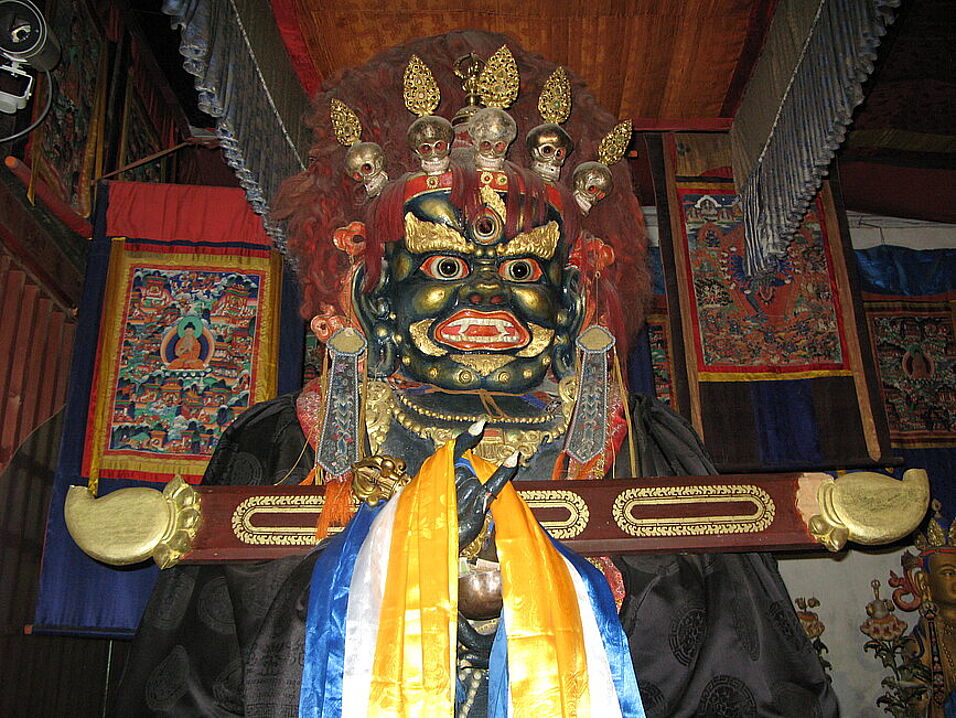There is a broad consensus among researchers that Buddhism in the Mongolian regions has been shaped by the dGe lugs pa school of Tibetan Buddhism since the late 16th century. This school prevailed in such a way that the other Tibetan Buddhist schools had little or no presence in Mongolia. The resulting monolithic Buddhist landscape in Mongolia is often compared to Tibet where, although at times in conflict with each other, different traditions always co-existed.
However, a closer look at the sources available to us indicates that the development of a specifically Mongolian Buddhism is by no means solely indebted to the dGe lugs pa. Mongolian chronicles like the anonymous Erdeni tunumal neretü sudur of 1607 or the Erdeni-yin tobci written by the Ordos noble Saγang Secen in 1662 testify to the activities of the rNying ma pa and Sa skya pa alongside dGe lugs pa monks at the turn of the 16th/17th century. Later historians like Isibaldan (19th c.) comment on the peaceful coexistence of the Sa skya pa, dGe lugs pa, Karma pa, rNying ma pa and even Jo nang pa in the Qalq-a regions as late as 1835.
In my presentation I argue that we have to reconsider the narrative of the dGe lugs pa dominance in 16th and 17th century Mongolia, in favour of a more nuanced description. By drawing on Mongolian sources of the time, but also on early translations of Tibetan Buddhist texts, I aim to show that rNying ma, Sa skya and bKa’ brgyud traditions were present (and sometimes even dominant) at that period in Mongolia and contributed significantly to the shaping of Mongolian Buddhism.
SPEAKER
Karénina Kollmar-Paulenz, currently visiting professor at the University of Vienna in the framework of the Cluster of Excellence ‘EurAsian Transformations,’ is Professor (em.) of Religious Studies and Central Asian Studies at the University of Bern (Switzerland). She holds a doctorate in Tibetan Studies and a habilitation in Central Asian Studies from the University of Bonn, Germany. Her research interests comprise the cultural and religious history of Inner Asia, Tibet and Mongolia, global history of religion, the history of non-European knowledge systems and Mongolian manuscript cultures. Her publications include Erdeni tunumal neretü sudur. Die Biographie des Altan qaγan der Tümed Mongolen. Ein Beitrag zur Geschichte der religionspolitischen Beziehungen zwischen der Mongolei und Tibet im ausgehenden 16. Jahrhundert (Wiesbaden: Harrassowitz, 2001), Kleine Geschichte Tibets (Munich: C.H.Beck, 3rd edition, 2014), and most recently, “Tibetan Sources,” in The Cambridge History of the Mongol Empire (ed. M. Biran / H. Kim, Cambridge: Cambridge Univ. Press, 2023).
REGISTRATION
Please register by June 13, 2024 at office.ikga(at)oeaw.ac.at if you wish to attend the lecture.
To participate online, please register here: oeaw-ac-at.zoom.us/meeting/register/u5EqdeqqqjIrGtGWK2FqTUl8RHvcT6TYlRTs. You will then receive access information by e-mail.

